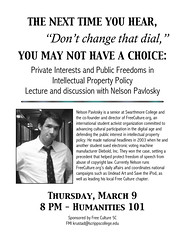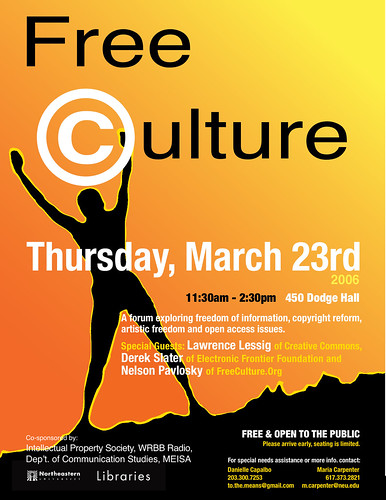It’s a good thing Daylight Savings Time doesn’t “spring ahead” until after April Fools Day, otherwise everyone would think it’s a horrible joke.
CORRECTION: I wish it were just a horrible joke, so that I could go back to sleep.

It’s a good thing Daylight Savings Time doesn’t “spring ahead” until after April Fools Day, otherwise everyone would think it’s a horrible joke.
CORRECTION: I wish it were just a horrible joke, so that I could go back to sleep.
Can anybody help me understand exactly what Digital Universe is supposed to be? According to Cnet it’s framing itself as a Wikipedia alternative.
At any rate, Lessig just joined their advisory board, so they merit a second look.
 Thanks to everyone who wished me happy birthday on IM and Facebook: I love you all! I was considering throwing a full-fledged birthday party today, but I was worn out from last week at school, so I just got together with a few friends from my hometown and played Scrabble and Risk. Gosh, I’m 22… my age is a palindrome.
Thanks to everyone who wished me happy birthday on IM and Facebook: I love you all! I was considering throwing a full-fledged birthday party today, but I was worn out from last week at school, so I just got together with a few friends from my hometown and played Scrabble and Risk. Gosh, I’m 22… my age is a palindrome.
Anyway, I will be in California in the LA – Claremont area this week, doing free culture stuff and visiting friends. I arrive on Sunday afternoon (today!) and depart for NJ on Saturday morning, so if you’re in the area and you want to see me, now’s the time to do it! I’m considering going to check the urban farm that is in danger of being paved over to build a warehouse, and also going to see the Electric 6, so there should be plenty of fun to go around ^_^
I will be speaking on Thursday, March 9 at 8:30pm at Scripps College in Humanities 101. (See the flyer.) I went out and bought a wireless presentation mousy-clicker thing for this talk, so it’ll be a little extra smooth and sexy. Do come!
Also, if you’re in the Boston area, I’ll be speaking at Northeastern University on Thursday, March 23rd, with Danny O’Brien and Lawrence Lessig, 11:30-2:30pm in 450 Dodge Hall. See the pretty yet bizarre poster: 
UPDATE: The event is indeed free and open to the public. Also, Danny has been replaced by Derek Slater, and while I will miss Danny’s British accent I’ll be glad to see Derek again ^_^ Here’s an updated poster: 
Some of you probably already know this, but here’s the truth: I’ve never used a medical drug in my life, except for anaesthesia during operations. Among other things, this means that I do not take antibiotics when I become ill.
One justification for my decision is that antibiotics are slowly becoming useless. What this means is that when you need antibiotics the most, they’re not going to be there to help you, but I’ll be fine because I’m used to fighting off diseases without the aid of antibiotics. If more people were like me, and antibiotics were reserved for life-threatening situations, then antibiotics would work better, and we wouldn’t have as much drug-resistant bacteria. Moral of the story: don’t use antibiotics unless your life is in danger, and maybe we’ll all live to fight another day.
Actually, there’s a less moralistic moral to the story: ban the use of antibiotics in feed for livestock, as suggested in the Slashdot comments. Bruce Sterling explains one way that bacteria get their drug resistance:
The runoff of tainted feedlot manure, containing millions of pounds of diluted antibiotics, enters rivers and watersheds where the world’s free bacteria dwell. In cities, municipal sewage systems are giant petri-dishes of diluted antibiotics and human-dwelling bacteria. Bacteria are restless. They will try again, every twenty minutes. And they never sleep.
Scary, and ewwwww.
I’ve decided to test out Plazes (see my location)… I’ve determined that it is only useful if you travel frequently with your laptop to places with multiple wireless networks. It is more or less useless on Swarthmore’s campus, b/c there are only 3 wifi networks that I use regularly: (1) the dorm network (2) SwatWireless and (3) War News Radio. Therefore you can’t really tell where I am on campus using Plazes. Facebook actually does a better job of determining your location, I think… but I’m not sure b/c I haven’t tested Plazes in dorms other than my own, maybe Plazes can tell the dorms apart as well.
I’ve also signed up for The Black Stripe (my profile), although I haven’t actually uploaded anything yet… I’m curious to see if it develops any useful features that Flickr lacks.
Also, Democracy Player (formerly DTV) just reached version 0.8 and is now available for Windows, definitely worth the download!
Finally, Flock just got a major update to 0.5.11 which means that it is based on the Firefox 1.5 codebase now and is much less buggy… I have to put it through its paces at some point, but Flickr integration has improved dramatically and it now has a (not so useful?) Yahoo maps topbar.
Can you folks do a sanity check on this article from the Guerilla News Network for me?
Step by step, Iran is being set up for war. What difference does the provocation make? The determination to consolidate the oil reserves in the Caspian Basin was made more than a decade ago and is clearly articulated in the policy papers produced by the Project for the New American Century (PNAC) The Bush administration is one small province away from realizing the its dream of controlling the world’s most valued resource. They won’t let that opportunity pass them by.(Annexing Khuzestan; Battle-Plans for Iran)
Does this make any sense? GNN is making specific, falsifiable predictions, which makes this article interesting even if it is incorrect.
If you have a hankering for games that make you think, or games that make you laugh and have a good time, or games that just make you say, “huh, that’s different,” check out the gaming blog that Adam Lizzi and I just started. It’s called ALASSCA, and it stands for “Adam Lizzi’s Abstract Strategy, Stairball, and Chessball Authority.” Adam likes to invent games in his spare time, and whenever he’s not brainstorming some new monstrosity, he’s hunting down bizarre and under-appreciated games from around the world.
If you’re curious as to why I’m involved, besides being a fan of Adam’s games, you might want to see my introductory post for the connection with free culture 😉 Hey, I have a free culture fetish, I can’t help looking for the free culture connection!
LJ users can subscribe at alassca. Please subscribe, read, and leave comments!
Warning: intense geekery follows.
I was browsing through Asheesh Laroia‘s Subversion repository, looking at the flyer he used to advertise my last talk at JHU, when Asheesh suggested that I look at the source code for the page.
HOLY @#$%, go to his Subversion repository, and then use your browser’s “view source” feature to see what’s going on behind the scenes of that page. (Warning: unless you are using Firefox or Safari, your browser may choke on that page.) Apparently this page is using a normal Subversion XML file and transforming it using XSLT into something pretty and readable. I have never seen anything so scarily efficient! I have no idea what that code means! And to think I was so proud of learning how to use CSS…
Asheesh cannot claim credit for creating the pretty XSLT, he is using the Insurrection web tools to prettify his Subversion. But he can take credit for noticing the awe-inspiring simplicity of that page!
Aphid sent me another question that didn’t actually make it into the final exam: Lessig and Walt Disney creativity
Aphid: heh.. im grading midterms right now [for introduction to digital media]. one of the questions is about diebold; there’s a short essay section on “Why might it be desirable to have voting software be open source?”
Here’s the exact question:
Diebold Election Systems is a company that designs and sells electronic voting systems. The Diebold AccuVote-TS™ touch-screen voting terminal has recently been adopted in many U.S. states. Inside these terminals is a 50,000 line computer program that records, stores, counts, encrypts, and distributes the votes cast by citizens using the voting terminals.
On its website Diebold assures us of the integrity and accuracy of its terminals: “When a voter casts their ballot using the Diebold touch screen system, the ballot selections are immediately encrypted and stored in multiple locations within the voting station. When stored, the order of cast ballots is scrambled to further insure ballot anonymity. The image of each and every ballot cast on the voting station is captured, and can be anonymously reproduced on standard paper should a hard copy of ballots be required for recount purposes” (See Diebold’s FAQ).
Unfortunately, Diebold considers the source code for its terminals to be a trade secret. In his recent art piece “Dark Source”, artist Ben Rubin has pointed out that this might be problematic (See the Dark Source project). Why might it be considered problematic that Diebold does not reveal to the public the internal (i.e., software) workings of its touch screen terminals? What are four important characteristics of free or open source software? Give three reasons why its might be a good idea to have the votes of democratic elections recorded and counted with open source software rather than with Diebold’s software.
I’m glad that Diebold has become part of curricula around the country, it’s important and should not be swept under the rug, but it still weirds me out… I wonder if this is how veterans feel when kids are learning about their war in history class?
This artist Ben Rubin actually contacted me and Luke back in the day, under the misapprehension that we had copies of the source code which we could give to him, but he quickly lost interest in us once he learned that we only had the e-mail archive. Ah, memories…